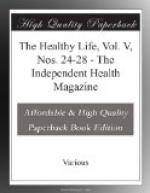The article (signed “M.D.”) with the above title which we published in the July number has, as we anticipated, aroused considerable discussion. One interesting criticism appeared in the August number. We now publish two further contributions, to be followed, in our next issue, by two further articles by Dr Rabagliati and Mr Ernest Starr.—[EDS.]
I
As one who has tried the low proteid diet, and came to grief on it, I desire to set my experience against that of Mr Voysey,[9] and to assert that, if it is true for him, it certainly is not true for me. Mr Voysey indulges in many loose and generalised statements which do not help the average man or woman in the least. I imagine it is these that “M.D.” has in mind when he advises a certain standard of diet, below which it is not safe to go. If Mr Voysey can, as Horace Fletcher can, exist on a very low proteid diet, that does not prove that all men and women can do the same and be healthily active; it only shows that he and Fletcher are exceptions to the average person, and that it may be dangerous to follow their example. For most men, “M.D.’s” proteid standard is not so nauseating as he finds it. Here is a specimen dietary for a day, for a man of ten stone, following, as most of us do, a sedentary occupation:—
3 oz. cheese. 9 oz. bread. 8 oz. vegetables and salad. 8 oz. fruit. 11/2 pints milk.
Will any average person say that that quantity, divided into three meals, would be nauseating to him? And is that diet so very expensive that it would be beyond the means of an agricultural labourer in any country? It is certainly no mockery. The cost to such a labourer would probably not exceed 3d. or 4d. Of course the diet can be made as expensive as one chooses, and widely varied.
[9] See August number.
Who amongst ordinary men and women has a reliable natural taste that would be an infallible guide in all matters of food? And what a misleading statement that is which asserts “that all the hardest work of the world has always been done by those who get the least food.” Put it to the test on the average person and see where it leads to.
My contention is that the average person, throwing over his or her accustomed meat diet, requires some definite guidance as to the quantity of proteid, such as Dr Haig’s wide experience and much patient research have proved needful, or at least advisable, for the continuance of a healthy and vigorous life; and I will say that it does not help this average person in the least to put before him the misty statement that “the quantity depends on the development that is in progress, and is only discoverable by the natural guides of appetite and taste, ruled by reason and love of others.” All very noble and very well in another place, but hardly meeting the case of the ordinary person who is seeking a




